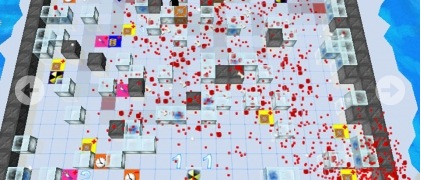New Zealand gets serious about games – Media Design School’s new game art and programming degrees to support industry growth
 Media Design School will fuel growth of the industry with the introduction of New Zealand’s first game development degrees.
Media Design School will fuel growth of the industry with the introduction of New Zealand’s first game development degrees.
The School has been supplying the game industry with talent since 2004 when it launched the Graduate Diploma of Game Development. However, the new degrees — Bachelor of Creative Technologies (Game Art) and Bachelor of Software Engineering (Game Programming) — will ensure the industry is populated with a new level of talent.
 The comprehensive three-year programmes have been developed in close collaboration with local and international game studios to ensure graduates are primed to enter the industry. Intense project-based learning replicates the studio environment, giving students experience of game production processes.
The comprehensive three-year programmes have been developed in close collaboration with local and international game studios to ensure graduates are primed to enter the industry. Intense project-based learning replicates the studio environment, giving students experience of game production processes.
Media Design School CEO Frances Valintine said offering world-class degrees in this high growth digital sector was a natural and exciting progression.
“The New Zealand game industry is growing due to the global demand for game content across all platforms — console, mobile, PC and online. This growth has continued year-on-year for over a decade and the projected future demand for game programmers and game artists exceeds the level of qualified graduates who enter the sector each year,” said Valintine.
She added that few industries offered the job security and level of salary that game graduates receive.
New Zealand’s game industry has made major leaps in recent years thanks to early adoption of digital distribution coupled with global demand for online and social games. Globally, the game industry now rakes in more than double the revenue of Hollywood films and triple that of the recording industry*.
There has never been a better time to consider a career in games, said New Zealand Game Development Association (NZDGA) Chairperson Stephen Knightly.
“Video games are high-tech, creative, digital exports — exactly the kind of products New Zealand wants to export more of. The New Zealand digital industry considers itself fortunate to have an asset such as Media Design School located here.”
Knightly said the skills used when making games are also highly transferable to corporate IT, web design, advertising and animation.
NZGDA is currently working with a range of government agencies on policies and programmes for New Zealand to capitalise on the boom in digital games and content.
Media Design School will welcome the first intake of bachelor students for the
game-focused degrees in August this year.
Interested students are invited to visit the Media Design School website for more information on the degrees.
* Sources: Gartner Research, Motion Picture Association of America, Recording Industry Association of America.
The Bachelor of Creative Technologies (Game Art)
The Bachelor of Creative Technologies is a three-year program designed to give graduates the creative and technical aptitude required to be employed as creative technologies professionals with a particular interest in game art.
The first year curriculum gives students a solid grounding in game art and design. The creation of 3D modelling, 2D and 3D visual assets, and creative problem solving is underpinned by the basic theories, philosophies and history of technology. Students learn to carry out processes that require a wide range of specialised technical or scholastic skills.
Knowledge and skills gained in the first year are further developed in the second year curriculum. Students now know how to design appropriate solutions to problems using production approaches that integrate ethical, social, legal, and economic concerns. New topics are introduced, including the use of middleware and the principles of architecture and game environments.
Students should additionally consider which areas of study they wish to specialise in. The range of art disciplines is broad, so the area of specialisation is largely a matter of personal interest. For example, students may wish to experiment with new technology to create art assets for games, or they may investigate the creative process for producing art assets.
Further techniques for producing quality game art assets are introduced in the third year curriculum. However, the focus of the final year is on designing and completing a major game production. This gives students the opportunity to apply their knowledge and skills both individually and as part of a team. Students will demonstrate mastery of visual art and design knowledge, skills and the professional issues necessary to begin practice in creative technologies. Upon completion of this project, students will have the abilities needed to undertake postgraduate study, or enter the game industry as a proficient game artist.
The Bachelor of Software Engineering (Game Programming)
The Bachelor of Software Engineering is a three-year program designed to give graduates the skills to be employed as a software engineer with a focus in game programming.
The aim of this qualification is to provide graduates with a highly developed skillset in software engineering, as well as a strong command of specialised technical and scholastic knowledge. Game programming and game development are the primary areas of focus for this software engineering degree.
In the first year curriculum, students are taught the essential theories, principles and knowledge needed for game programming and game development. This includes an overview of C++ programming and practical mathematical skills. Students also gain experience constructing, testing and debugging basic computer games. This gives them a comprehensive foundation on which to develop the knowledge and skills that are taught in the second year.
Theories and the depth of knowledge in the second year curriculum significantly increase in complexity. Additional fundamental techniques are also explored. Students consider management strategies needed for the collaborative game production in the third year.
The third year curriculum focuses primarily on creating a major game production. This production is a chance for students to apply all of the skills and knowledge that they have learned.
Following the production, students evaluate the project to identify the strengths and weaknesses encountered during the production process. This experience as a whole gives students sufficient knowledge and skills to become a professional and valued member in the industry, or to enter postgraduate study.
